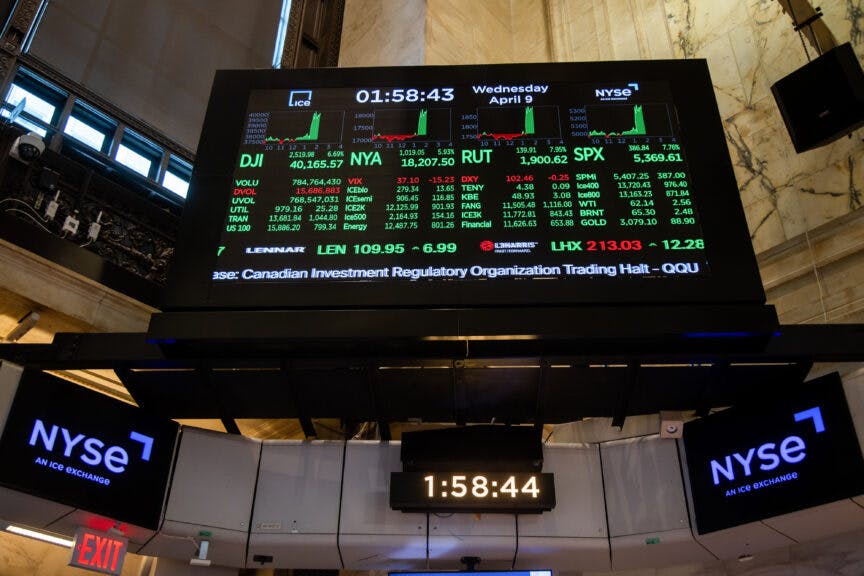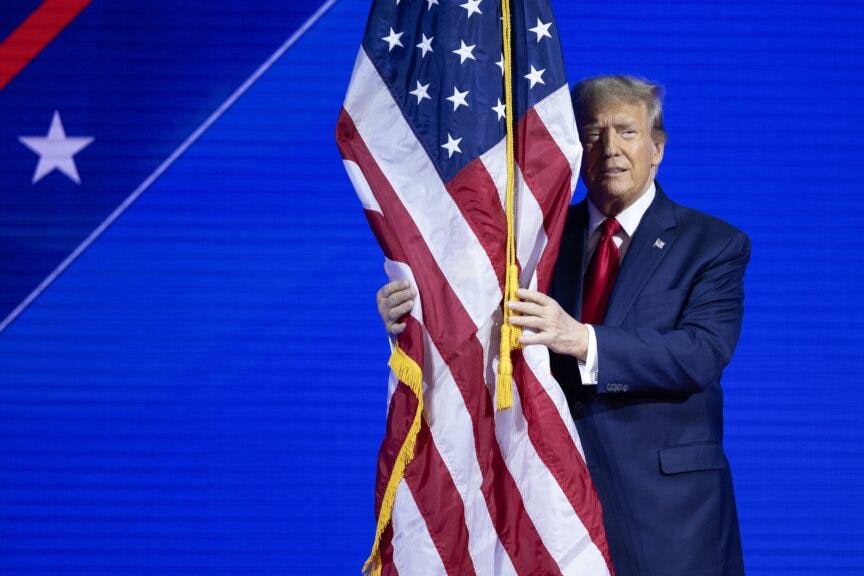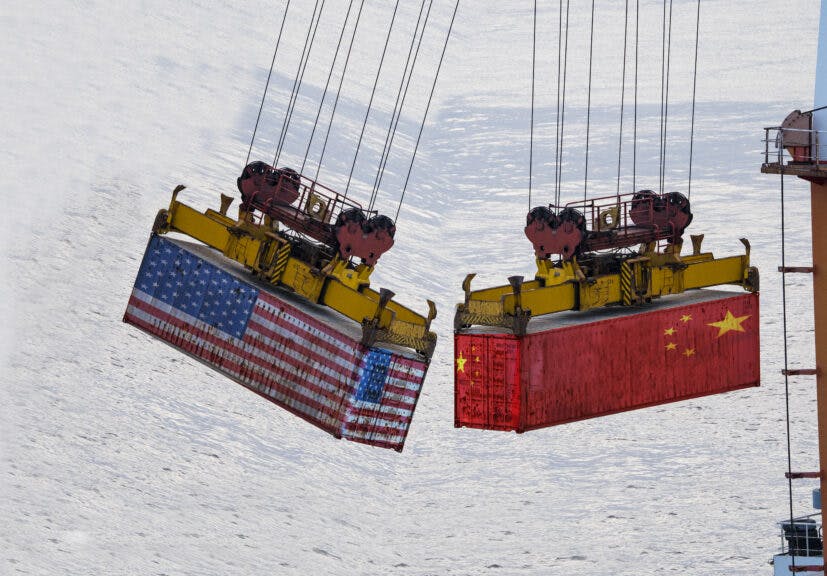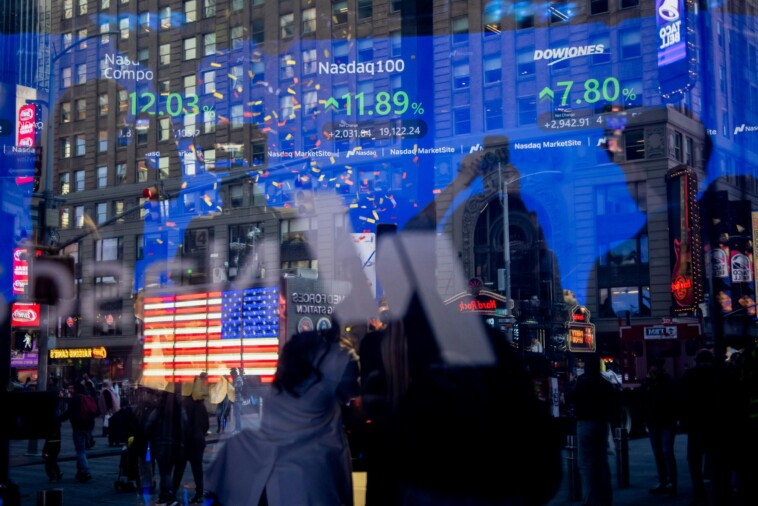Trump pauses most tariffs — and sends the market soaring! While the market recovers, the Trump administration says it’s time to focus on tax cuts for everyday Americans. Will China hold out in its tariff war with Trump? We spoke to a supply chain expert about Beijing’s next move.
It’s Thursday, April 10, and this is the news you need to know to start your day. If you’d rather listen to your news, today’s edition of the Morning Wire podcast can be heard below:
Trump Pauses Tariff Hike, Stock Market Skyrockets

(Photo by Michael Nagle/Bloomberg via Getty Images)
Topline: In a stunning development Wednesday, President Trump paused virtually all global tariffs, with the exception of China.
One week ago, the president enacted the largest tariffs in a century, and then on Wednesday, with a single social media post, he put nearly all of them on pause. Trump announced in a Truth Social post that effective immediately, there would be a 90-day pause on almost all tariffs — in the meantime, a flat 10% rate will go into effect.
Within five minutes of the announcement, trillions of dollars in value had been added to the markets. By the time markets closed, the Dow was up more than 2900 points – nearly 8%, and the S&P skyrocketed almost 10% – that’s the largest one-day gain since 2008. The NASDAQ saw its biggest daily gain in nearly a quarter century, surging 12%. All told, the broad market index on Wall Street saw its third-largest gain since World War II.
However: While the vast majority of U.S. trading partners held off on retaliatory tariffs and sought a deal, China raised rates to 34% and then 84%. That seemed to outrage the president, who said, “Based on the lack of respect that China has shown to the World’s Markets, I am hereby raising the Tariff charged to China by the United States of America to 125%, effective immediately.”
Last year, the U.S. imported $440 billion of goods from China – American exports to China are only about a third of that figure, at around $144 billion.
“What China is doing will affect their economy much more than it will ours,” Treasury Secretary Scott Bessent said on Wednesday. “This was [the president’s] strategy all along. You might even say he goaded China into a bad position. They responded. They have shown themselves to the world to be bad actors.”
Bessent went on to specifically note that Vietnam, India, South Korea, and Japan were all at the front of the line for negotiations –- those are all China’s biggest competitors in Asia. The move has led some analysis to conclude that the White House is sending a message to Beijing: make a deal now, or the US and the rest of the world will send their business elsewhere.
Trump’s Push For The “Big, Beautiful Bill”

(Photo by Tom Brenner for The Washington Post via Getty Images)
Topline: Amid the tariff fallout, the White House is working to make its economic case to Main Street Americans.
President Trump spoke about his plan to extend his 2017 tax cuts at the National Republican Congressional Committee dinner on Monday, urging Republicans to vote for a budget proposal he’s calling the “big, beautiful bill.” In addition to tax cuts, it would raise the debt ceiling and allocate more money for the Trump administration’s deportation efforts. Republicans are reportedly hoping to pass the bill by Memorial Day. House Speaker Mike Johnson canceled a planned vote on the Senate-approved budget blueprint on Wednesday night after a “subset” would not support it.
“For too long, financial policy has served large financial institutions at the expense of smaller ones. No more,” Secretary Bessent said in a speech to the American Bankers Association on Wednesday, outlining some of the president’s agenda. “This administration aims to give all banks the chance to succeed, whether it’s JP Morgan or your local mortgage and loan. It aims to get capital to Americans who need it by getting bureaucracy out of the way… It’s Main Street’s turn to hire workers. It’s Main Street’s turn to drive investment. And it’s Main Street’s turn to restore the American dream.”
In addition to this broader populist economic message, Bessent took the opportunity to address the health of the American economy and other campaign promises made by President Trump. “Our fiscal situation is a 350-pound, two-pack-a-day smoker on the ICU table, and he or she is not going to get off that table and run the Iron Man. We can’t [eliminate deficit spending] all at once, or that will cause a recession. What will keep us from having a recession is making sure that the tax bill doesn’t expire, adding back 100 percent depreciation and then adding some of President Trump’s agenda — no tax on tips, no tax on Social Security, no tax on overtime.”
China Vs Trump

(Photo by Yaorusheng via Getty Images)
Topline: Will China hold out in its tariff war with Trump? We talked to a supply chain expert about what Beijing might do next.
Morning Wire spoke to Jim Nelles, an expert supply chain consultant, about President Trump’s retaliatory tariffs toward China. Nelles just returned from a trip to China and has clients who do business with the communist nation – his assessment of their ability to weather an economic slugfest was rather grim.
“What people [in China] were saying off the record is that they’re extremely concerned with a tariff war with the United States,” Nells told Morning Wire.”Their manufacturing sector is not where it has been in the past. Some of the factories are running up between 40 and 60% capacity utilization, which is not good… a lot of my clients before Trump announced all the reciprocal tariffs, their Chinese suppliers were saying, “Hey, we’ll send you components to other places in Asia, and you can assemble the components there to avoid the Chinese tariff.” They’re doing everything they can to try to figure out how to get around these tariffs that are in place.”
Nelles also told Morning Wire that while he agrees that it was “a good time” for Trump to pressure China, he believes that the best outcome would be for “everyone [to] get rid of all the tariffs and all of the non-tariff trade restrictions, so that we can have what we all want, which is free and fair trade.”



